CHHSM Agencies Create Safe Homes for LGBTQ+ Elders
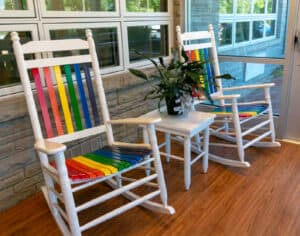
By Renee DeLuca, multimedia content specialist, UCC Office of Marketing Communications. Originally appeared in UCC News April 2, 2024. Used by permission.
Imagine spending your life with a partner, and when the time came for seeking a place to live during retirement years, the homes and assisted living neighborhoods you found made living with that partner uneasy at best. Fears of safety and belonging follow those in the LGBTQ+ community in many places, but home shouldn’t be one of them.
Fear of losing a comfortable lifestyle is what can happen to those in the lesbian, gay, bisexual, trans, and queer community when they begin to age — they worry, what if my partner isn’t accepted? Will I have to be untruthful about our relationship? Go back into the closet? Or, will my LGBTQ+ child feel comfortable visiting me?
It’s a real concern. Fortunately, United Church Homes (UCH) — a member of the United Church of Christ’s Council for Health and Human Service Ministries (CHHSM) — and other similar organizations have made this a non-issue.
Founded in 1916, UCH began its mission at a time of ethnic discrimination, poverty and pandemic. There were no safety nets for the poor or older adults like today.
The Rev. Dr. Ken Daniel, president and CEO of UCH, which is based in Marion, Ohio, said its history has had an inclusive value structure for many years.
“This means being inclusive of the disabled, those of limited financial means, Hispanic, African American, and Native Americans, as well as those in the LGBTQ+ community,” he explained. “It’s part of our DNA.”
‘Everyone is Welcome Here’
An inclusive philosophy is posted clearly in UCH’s “About Us” statement on its website: “For decades, our calling has been to foster an environment of purposeful living. Today, United Church Homes extends this hospitality to people of all faiths, gender expressions, and sexual orientations.”
Everyone is welcome at UCH communities, as these rainbow rocking chairs at one of its facilities demonstrate.
Currently, UCH serves over 6,000 people in 90 locations across 15 states. These locations include everything from independent living to retirement communities, skilled nursing and rehab centers, affordable housing — and even a program for those aging in place at home called UCH Cares.
The LGBTQ+ advocacy organization SAGE certifies UCH in care for LGBTQ+ elders. Each year, SAGE trains staff, campus leaders, and even the UCH board, designating UCH homes and communities across various levels from basic to platinum.
“We go so far as to put placards at our doorways letting people know that everyone is welcome here,” said Daniel. “We know that having the word ‘church’ in our name can cause people to react to past experiences with church organizations, and we don’t want our residents to experience that.”
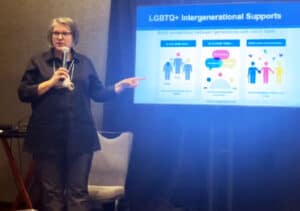
The Rev. Beth Long-Higgins is vice president of engagement and director of the Ruth Frost Parker Center for Abundant Aging at UCH and has served on their board in the past. She was part of the board when in 2012 they voted to become an Open and Affirming organization — the first member of CHHSM to take this groundbreaking step.
“We cannot not do this,” Long-Higgins said. “Those who live in the closet have a life span that’s seven years shorter than those who live openly. We can’t continue to perpetuate discrimination.”
A Long Affiliation with the UCC
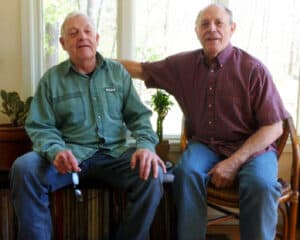
Herschel Murner is the president and CEO of Uplands Village — another CHHSM agency in Pleasant Hill, Tenn., in the southern Appalachian Mountains. Murner said Uplands is also an Open and Affirming and SAGE platinum-certified community, where residents can own their own homes or rent, if they prefer.
Those homes include free-standing single-family or duplex houses, and even options such as a geodesic dome. Founded in 1922, Uplands Village has a long affiliation with the UCC.
Uplands Village in Tennessee has a 500-acre campus between Nashville and Knoxville. Murner stresses that it’s their location that separates them from other living communities.
“We have a 500-acre campus situated between Nashville and Knoxville,” he explained. “It’s a natural environment, with rain gardens and hiking trails.”
This setting attracts many residents, he said, such as Robert Cheatham and Michael McGregor.
Cheatham, 80, and McGregor, 68, have been together for many years. Both are retired today, and they’ve lived at Uplands Village for almost a year, having moved from Nashville.
“We Googled ‘gay friendly,’ and this was the only place that came up within our search parameters of several states,” said Cheatham. “We are both big environmentalists, and in Nashville it seemed they were cutting down all the trees. This place is a wildlife sanctuary, a big draw for us.”
“I have so many hummingbirds here, and woodpeckers too,” exclaimed McGregor. “I even saw a fox recently.”
But it’s not only the setting that attracted them. “We feel safe here,” McGregor said. “There are a lot of people in the city who aren’t gay friendly, and people shouldn’t be that way; it’s not healthy. Everyone here is so friendly. There are people here from all over the world.”
“We enjoy it here,” agreed Cheatham. “We lived in a heterosexual world our whole lives, and we like this community because we feel safe.”
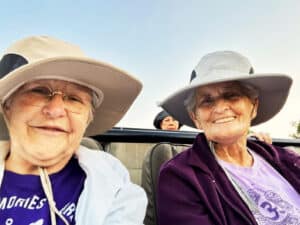
Marilyn Loper and Ginger Mabe are also Uplands Village residents, for almost two years now. Loper, 79, and Mabe, 81, said they were originally looking for a retirement home in Florida.
“We were especially interested in a place that offered a CCRC — Continuous Care Retirement Community,” Loper explained. “But we visited this place while on a road trip and it fit the bill. Plus, it’s very close to good medical care at Vanderbilt Hospital if we need it.”
But it wasn’t just the medical services that attracted the couple, who have been together for 28 years.
“People here are very liberal, and from all over,” said Loper. “One of the first things I noticed was that not one neighbor said anything bad about another neighbor. Everyone is very supportive. We don’t worry about our safety in this neighborhood.”
Aging in Place
For those who would prefer to age in place, Phoebe Ministries out of Allentown, Pa., offers what they call a continuing care retirement community without walls. The CHHSM member’s Pathstones Continuing Care at Home program is one of 40 to 50 across the United States, and Lisa Hoffman is the executive director. She explained that the program specializes in long-term care and wellness coordination.
“We assign a care coordinator to you,” she said. “And it’s all about the relationship we build. We want people to get care sooner rather than later, and we want to assess people before they’re struggling.”
Pathstones is SAGE certified, and this is important to the organization.
“Some of our clients have concerns about going into a facility because they are LGBTQ+,” Hoffman said. “Many don’t have children to care for them, and we want to be inclusive. We believe in putting inclusive language in place, asking inclusive questions during intake. It’s part of discovering who they are at a very vulnerable time.”
She is proud of the SAGE training her small staff has taken. “We bring education and awareness to healthcare from beginning to end.”
Revitalizing the Neighborhood
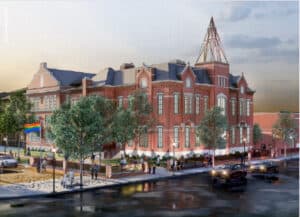
One of the most exciting LGBTQ+ communities under the UCH umbrella is the Longfellow Commons Community capital project under development in Dayton, Ohio.
UCH is working to repurpose an old school in a historic area of this urban setting — and bring a creative, just, innovative, and safe independent living community to Dayton. This project hopes to become the highlight of the downtown area.
Gloria Hurwitz, UCH vice president of advancement, has been working on fundraising to bring this vision to life.
“It will feature a theatre, pickleball courts, a speakeasy, and eventually a grocery store, a hair salon — this will be a community for everyone,” said Hurwitz. “Not just LGBTQ+ friendly, but allies as well. We want to revitalize the neighborhood.”
It’s a $52 million investment put together with public and private funds. Currently, UCH has raised $6.6 million towards the $10 million capital campaign goal. Longfellow Commons hopes to have a groundbreaking in 2025.
“We will be starting the public phase of the campaign soon,” said Hurwitz. “We’re currently meeting with individuals to build momentum. Everyone is excited about it, and we hope to feature 126 units on a five-acre campus by 2027.”
Donations are being accepted through the UCH fundraising website.
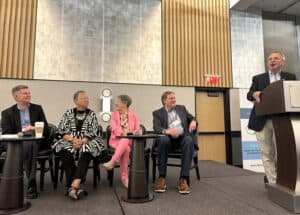
Also looking to the future, Daniel is excited about a new UCH partnership with Care Source and The Radiant Alliance, which will allow United Church Homes to begin LGBTQ+ friendly service programs managed by Medicaid.
“The goal is to gather nonprofits in this partnership to participate and help people before they need home care, to keep them out of traditional nursing homes and the emergency department,” he said. “We will be able to serve a larger population as an embedded partner — operating in many states over time.”
Daniel stressed the need for such a program.
“This collaboration will enable us to make a significant impact in helping more people age abundantly — the United Church Homes’ core mission,” he said.
Join Our Mailing LIst
"*" indicates required fields
Follow on Facebook
New Resident Finds Belonging at Emmaus Homes - CHHSM
www.chhsm.org
Heather’s journey toward independence has been nothing short of inspiring. Since moving into her new home last year, Heather’s world has expanded in ways she never imagined. Leaving the familiarit...